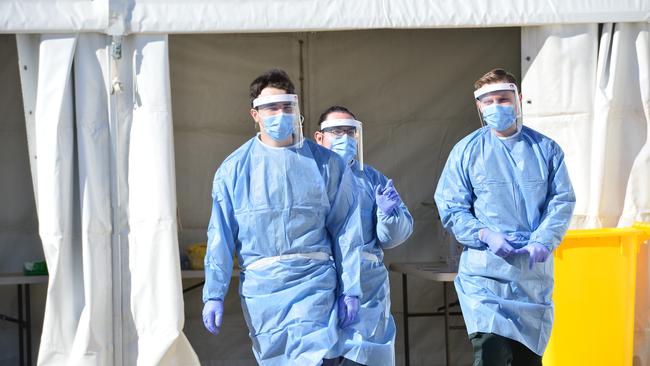Steven Marshall announces tough COVID-19 changes to SA’s aged-care sector
Steven Marshall has announced tough COVID-19 changes to SA’s aged-care sector, including a ban on staff working at multiple sites from August 27. It comes as SA continued its run of no new cases.
Coronavirus
Don't miss out on the headlines from Coronavirus. Followed categories will be added to My News.
- COVID marshals required as Vic border tightened
- Our brave nurses on the eastern front
- The Advertiser +Rewards – giveaways, offers and competitions
Strict new restrictions to safeguard aged care home residents from coronavirus come into effect from August 27.
As SA recorded its sixth straight day of no new cases the government announced:
ALL doctors, nurses and personal care workers in aged-care homes will have to wear personal protective equipment including masks if they come with 1.5m of a resident such as feeding or showering. The change does not apply to visitors such as family members;
ALL personal care workers will no longer be permitted to work across more than one aged care homes. The change does not affect other workers such as cleaners.
The moves, which were foreshadowed in The Advertiser , were vital to “make sure we have our unblemished record (in nursing homes) kept in place,” Premier Steven Marshall said
the new restrictions include a ban on staff working at multiple sites from August 27.
And all staff including doctors, nurses and personal care workers will have to wear personal protective equipment when within 1.5m of residents.
There have been 1310 COVID cases recorded among residents living in federally-subsidised residential aged care homes in Australia and almost 198 deaths as of Wednesday according to the federal Department of Health.
The vast majority of these are in Victoria with 1247 cases and 167 deaths, while South Australia has not recorded any cases among residents of nursing homes.
The only SA case linked to the aged-care industry was a female carer working at St Louis Nursing Home, at Parkside, who contracted the virus in March while playing social basketball.
Office for Ageing Well director Cassie Mason had called for increased protection including increased infection-control measures such as mandatory isolation for residents awaiting their test results and limitations on staff movements across facilities.
The August 27 start is to give operators time to adjust staffing and obtain PPE for medical and carer staff.
Officials had discussed making family and visitors also wear masks but decided against it – at this stage – as evidence from interstate shows the main source of infection in nursing homes comes from staff.
Mr Marshall acknowledged the change would create difficulties for the sector.
He said SA has not had an infection in an aged care home resident and “we want to keep it that way.”
“We don’t do these things lightly,” he said. “We have very good reasons.”
Officials were unable to estimate how many workers would be affected by restricting them to one facility.

Chief Public Health Officer Professor Nicola Spurrier said the outbreak in New Zealand after it had gone for more than 100 days without an infection shows it is possible to eliminate the virus but not the risk of it resurfacing.
“It is absolutely a warning sign for South Australia,” she said.
Prof Spurrier said a team at the Women’s and Children’s Hospital is putting together a training package on infection control for sites such as aged care homes.
The aged care changes come as officials continue to work out how the looming requirement for many businesses to have COVID marshalls will work.
They will be required in venues which have large gatherings ranging from pubs and restaurants to places of worship, to ensure requirements such as social distancing are observed.
Details such as when and where training courses for the work can be accessed “are still being worked out,” Mr Marshall said.
Police Commissioner Grant Stevens said a range of practical issues regarding the marshalls are still being finalised but indicated places which go from quiet to crowded will be given some flexibility.
They will be able to have a staff member take on the marshall role as well as their normal job if there are less than 200 people in the venue, but if the crowd grows to over 200 it will need to get a dedicated marshall who is not juggling a dual role.
Commissioner Stevens also noted it would not be SAPOL’s job to enforce he new rules regarding staffing in nursing homes.

